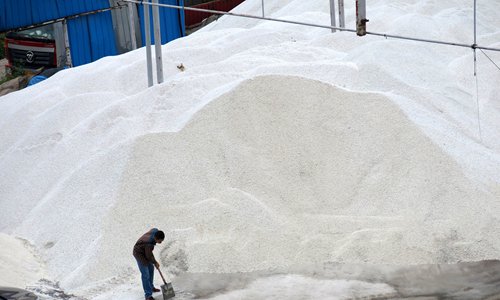HOME >> BUSINESS
China unlikely to trade with North Korea for rare mine: insider
By Li Xuanmin and Shen Weiduo Source:Global Times Published: 2019/10/24 21:08:40
Nation unlikely to trade with North Korea for rare mine: insider

A worker unloads rare earths along the Yangtze River's banks in Southwest China's Chongqing Municipality on May 9. Photo: IC
A reported deal under which China could tap a North Korea rare-earth mine in exchange for solar investment appears unlikely, as the deal is not "an optimal one" for China in terms of business aspects, industry insiders told the Global Times on Thursday.
Insiders also pointed out that even if the deal materialized, it would not mean that China has violated UN sanctions on North Korea, and an industry insider stressed that China will invest and trade with North Korea within the scope of UN regulations.
North Korea is planning to grant China access to a rare-earth mine, in exchange for investment in solar energy that could ease its chronic power shortages, according to a Reuters report on Thursday, citing a post published on the Association of China Rare Earth Industry.
"Putting the cost of a 2.5 million kilowatts per day solar plant in North Korea at around $2.5 billion, China's reward for investing would be mining rights to a rare-earth mine in North Pyongan province on its borders," said the Reuters report.
An insider close to the Association of China Rare Earth Industry told the Global Times on Thursday that the post was forwarded from other sources, and he could not confirm the credibility of the story.
China's Foreign Ministry said on Thursday that "it is not aware of the deal." China's Ministry of Commerce did not reply to an interview request by the Global Times on Thursday.
From a business perspective, the deal is not likely to occur because North Korea is rich in light rare-earth reserves, which are not that strategically important compared with heavy rare earths, Wu Chenhui, an independent industry analyst, told the Global Times on Thursday. China has abundant reserves of light rare earth in Baotou, North China's Inner Mongolia Autonomous Region.
"The domestic market is kind of oversupplied in light rare earths," he added.
In terms of heavy rare earth, Chinese companies have established long-term trading relations with suppliers in Myanmar. "The only edge North Korea has is a low cost, but the transportation facilities are also much more convenient in Myanmar ... so I don't see the need for China to source the mines from North Korea," Wu noted.
North Korea doesn't have technologies related to rare-earth mining and extraction. So for the deal to be carried out, China would have to send technicians to help the local industry's development, an industry insider told the Global Times on condition of anonymity.
"Several years ago, China has sent technical personnel there to investigate rare-earth mines," the insider said.
The deal has also been questioned in terms of whether it would comply with UN sanctions, adopted shortly after North Korea's fourth nuclear test in 2016, which prohibit North Korea from supplying, directly or indirectly, rare-earth minerals.
Wu pointed out that even if the deal is reached, it does not mean that China has violated the UN sanctions on North Korea. "The sanctions do not ban individual countries from shipping other rare-earth products such as rare-earth oxides," Wu explained.
Lü Chao, a research fellow on North Korea at the Liaoning Academy of Social Sciences, did not exclude the possibility that the two could reach a deal within UN regulations, also he considered the deal "unlikely."
"As UN sanctions on North Korea have not been lifted yet, Chinese companies would still hold a cautious attitude about investing in the country," Lü told the Global Times on Thursday.
Rare earths are widely deemed as China's leverage that could inflict massive damage to various US industries, including the defense sector, during a protracted trade war between the world's two largest economies.
China also dominates the global rare-earth industrial chain and accounts for 80 percent of US imports of rare earths, according to US Geological Survey data. So far, these minerals have also been excluded from the list of Chinese products on which the US has threatened to impose tariffs.
The US government has been rushing to secure rare-earth supplies from other countries including Canada, Australia and Mongolia.
Newspaper headline: Nation unlikely to trade with North Korea for rare mine: insider